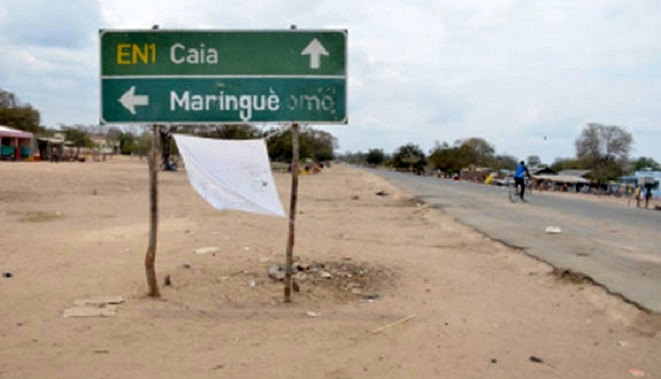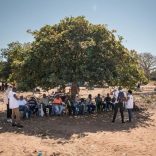Mozambique: Health Ministry hopes to vaccinate 18 million children against polio
Children involved in Nhamapaza sex trade

Noticias
Nhamapaza, in Maringuè district, Sofala province, is registering an increasing number of women in the sex trade. From various parts of Mozambique and neighbouring countries, sex workers flock to the area stimulated by the movement of truck drivers who stay there waiting for the departure of the military escort.
It is a ‘business’ that has children as mediators between the truck drivers and the women who practice this activity.
One particular aspect of this activity is the involvement of children acting as intermediaries between sex workers and their clients, especially regarding the terms of business.
Since 2014, the country has been living in a climate of violence and political instability provoked by Renamo, which refuses to accept the results of the general and presidential elections held in October of that year. As a means of supporting its protest and pressing the Government to fulfil its wishes, Afonso Dhlakama’s party has initiated a series of military attacks, mainly in the central and northern areas of the country.
The climate of insecurity that has since settled along the main roads of the country has led to the creation of military escorts that guarantee the safe movement of people and goods, particularly among the most dangerous sections, such as Caia-Nhamapaza, Save-Muxúngue in Sofala province, and Catandica-Vandúzi and Vandúzi-Changara in Tete.
Due to the military escort, fixed hours are established for trips from one point to another. Waiting for the departure of the military escort causes truck drivers and other travellers to mass at points of departure for long hours. Small businesses have consequently sprung up, from food preparation and sale to the sex trade.
Such is the case in Nhamapaza, a quiet rural town in the district of Marínguè. Considering that it is one of the side-effects of the political-military conflict, a SEKELEKANI research team headed to the spot, where it found a rural village that, calm during the day, at night becomes really agitated and with deafening sounds of music played chaotically in different tuck shops, where the darkness of the night is challenged by electric generators and lanterns of the most diverse powers and origins of manufacture.

If during the day Nhamapanza is a calm and quiet place, at nightfall it changes, illuminated by generators and lanterns, agitated and depraved with women on one side preparing and selling food to truckers and other travellers, and on the other selling their bodies for sex. Among these are girls, aged between 18 and 25, some from the cities of Beira and Chimoio, as well as from Caia, Inchope, Gorongosa, Nhaminga, Mafambisse, Sussundenga. Others are from neighbouring Zimbabwe.
The main customers are the long-distance truck drivers who wait overnight for the protection of the military escort, which accompanies them to Caia. During the wait, they come in contact with the potential sex workers and discuss the prices of their services through children, who are paid between 30 and 50 meticais for their “good services”.
In addition to its ominous exposure to a morally reprehensible activity, the worst consequence of child involvement is the irregularity in school attendance, which can culminate in the permanent abandonment of school attendance.
Due to the permanent presence of police forces and the Army, the SEKELEKANI research team had to camouflage itself as a potential client in order to penetrate as deeply as possible into the scenario.
The sex girls develop their activities in rooms aligned in the shape of a train, which is why this 16-room building is locally called a “train”. The “train” rooms are rented for 100 to 500 meticais per day or per month respectively. The owner of the establishment, which is still under construction, says that in the first phase the aim was to rent the rooms to local primary teachers and other people who passed by, since Nhamapaza is a road corridor. Now some girls, single or divorced mothers, live on the ‘Train’ with their young children.
 Away from home…There is no shame
Away from home…There is no shame
According to reports from the Nhamapaza population, the sex business has been around for quite some time, but swelled to it current proportions in these “recent times”, due to the concentration of truck drivers and other travellers waiting for the departure of the military escort. The news of the new “encampament” spread to other regions in the centre and north of the country, mobilizing the dozens of girls who have now settled in the “train”. According to the same reports, local women are not known to develop this activity, due to the fear of public condemnation by relatives and acquaintances.
The SEKELEKANI team talked to some of these sex workers, identified by fictitious names in the sections that follow.
Joana, from Sussundenga, Manica province, says she arrived in Nhamapaza last year. Asked about the reason for leaving her home zone, she explains that “there was no movement there, while here the business is good. Besides, in Sussundenga. I had to hide because of my family”. Joana does her acticity with her youngest daughter and says that she will return to Sussundenga as soon as the military escort activity ceases. “I’m with my daughter, I’m going with her to the truck. If I go to spend every night I’ll leave her here alone. When I finish the escort, I’ll only stay two more months. “
Like Joana, other girls say that the location of Nhamapaza, far from their families and other people who know them, is favourable for practicing this activity.
“I’m from Inhaminga, I’ve been here since 2014. I came here because I wanted to live free. No-one here is controlling my life,” she says.
The peak of business is after 22:00 hours, at which time the girls leave the train and go to the road where their potential customers are. Each program has its price: if the encounter takes place inside the truck the price ranges from 100 to 150 meticais; If it occurs in their rooms, it reaches 200 meticais, and can reach between 500 to 700 meticais if the client intends to stay overnight.
Ana, a recent arrival from Nampula and the mother of a one-year-old girl, says she can get up to six clients a night. She claims to have had a disagreement with the child’s father and, in order to escape from him and his family, fled to Nhamapaza. “When I’m with a client, my daughter stays with me, but when she wakes up, I pay someone to take care of her. I ran away from the child’s father because he wanted to separate me from my daughter because of my job.”
 Intermediary children
Intermediary children
In the midst of the back-and-forth of truck drivers and women a marked number of children making their way to the road. They usually circulate in groups of 3 to 4. Apparently they are selling water, peanuts, sausages and other products. However, in reality they serve as intermediaries in the sex business.
They are children between the ages of 10 and 15, who do this work after school without their parents knowing. The reason is simple: “We want to buy phones, clothes, snacks. The money we get here is for us; we do not take it home,” says one of the boys.
The mediation of the children is simple: once they have received from the truck driver the description of the physical characteristics of the girl he prefers , they go with him to the “train”. According to them, they earn between 100 and 200 meticais per day like this.
“I started identify girls for truckers at the age of 7. When a boss says he needs a woman, I’ll call, and he pays me 30 or 50 meticals for the service. This business has been going on a long time, but it has increased because of the escort,” one boy says an intermediary boy.
The children know the “train” girls very well, including those who have some infection or disease. “There are others that have diseases and we know who has and who does not. When the client says they liked one we know to be ill, we tell him, because we know all of them.”
There are also children who sell traditional remedies, which are said to be effective in protecting those who have sex with a menstruating woman or to avoid back pain, as well as acting as sexual stimulants.
The involvement of children in this activity has had negative effects on their education. “The (military) column is affecting student performance. This has been verified from the fifth class,” pedagogical director of the EPC of Nhamapaza Mateus Limpo says.
 Prevention of STIs
Prevention of STIs
In order to prevent the spread of sexually transmitted infections (STIs) in Nhampaza, the health authorities have set up a temporary health post. But asked about seroprevalence in the area, the nurse in charge said that the post is not able to do HIV tests or diagnose STIs. According to her, syphilis and gonorrhea are the commonest diseases in women aged 15 to 28 years. About 7 to 10 cases are diagnosed per month, but there is no medication at the clinic.












Leave a Reply
Be the First to Comment!
You must be logged in to post a comment.
You must be logged in to post a comment.